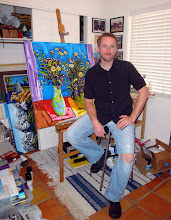
This week I am busy working on two paintings, one of the mission church at Chimayo, New Mexico, and another large commissioned piece of the Golden Gate Bridge in San Francisco. The thick layering process that my works go through often involves setting one aside in favor of another so that a dry surface can set up and I can later go back over the top of it without cutting into the paint.
I am very excited to now have paintings in the Taos Fine Art Gallery in Taos, NM. This is a beautiful gallery right in the center of Taos, featuring a wide range of artists from contemporary to classic. One painting from the group of 8 works originally taken to Taos has already sold, and we're certainly hoping for a good summer season there.
I've recently been thinking a great deal about the life and work of Vincent Van Gogh. It occurs to me that I believe what dominates his persona are the twin perceptions his difficult life and his work. I think perhaps that art lovers have been far too consumed with the idea of the "peintre maudit", who lives and suffers for their work. This is, of course, quite true for many artists like Van Gogh and Modigliani - but this is not the extent of it and nor should it be. What has always struck me as amazing about Van Gogh was not that all of his works were masterpieces - clearly I think that he did some very poor quality works - but that there are enough masterpieces in his collection that we should be humbled most by the fact that he managed an astounding output of work while battling hopeless despair, mental illness, and terrible luck in love. That somewhere, when the entire world was spinning around him, he was able to find a quiet spot of optimism to create and thrive in. Later, while battling what many believed was epilepsy combined with other psychological disorders - he managed to go on working in his lucid periods, and create, even in the confines of an insane asylum - true masterpieces like the "Irises" at St Remy.
So shouldn't it be better said that he accomplished all that he did in spite of his despair and illness? Yes, I believe so. I think that the man shone through best through his work and his letters, and the picture that emerges is a person of great tenderness, of deep, sharp intelligence and sense of purpose - and someone who must have had a great deal of physical strength and endurance to spend years of hardship, often without sufficient food or self care - surviving on coffee at some points and scrimping on food in order that he could buy paint.
I think that is should also be better known that Van Gogh did not die unknown. In fact it is probably more fair to say that he died on the cusp of becoming known. He had had a critical article written by Aurier who praised him immensely. He had the respect of many of his fellow artists - notably Pissaro. It is also not generally well known that Van Gogh had exhibited ten paintings at the Salon des Independants in March of 1890, and that Theo Van Gogh had written to Vincent that "Your paintings in the show were very successful. Monet said your pictures were the best in the whole exhibition." It stands to reason that if, in 1890, a certain Claude Monet made a comment like that - then Vincent was no longer an unknown quantity. What would any of us give, if we lived in that time, to have received such praise from Claude Monet?
The legacy of Van Gogh is a legacy that lives on in the rest of us, whenever we use a blazing yellow, when we load our brushes and carve out new imagery in a thick, undulating surface of paint. Vincent broke down the walls that so many of us were able to step over so much more easily. My only wish would have been that he could have had some idea that he was to become one of the most renowned creative artists in the history of the world - then perhaps that lonely gunshot in the fields of Auvers in 1890 would have never happened.
Visit Neil Myers' official website at http://www.neilmyersart.com/

No comments:
Post a Comment